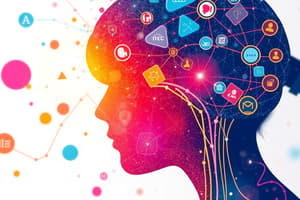Podcast
Questions and Answers
What is social cognition?
What is social cognition?
- The study of how people process, store, and apply information about other people and social situations (correct)
- The study of how people form relationships with others
- The study of how people perceive and interact with their environment
- The study of how people learn and remember information
What are the four stages of social cognition?
What are the four stages of social cognition?
- Attention, perception, memory, and reasoning
- Input, output, feedback, and adjustment
- Observation, analysis, interpretation, and application
- Encoding, storage, retrieval, and processing (correct)
What is social schemas theory?
What is social schemas theory?
- A theory of personality development
- One theory of social cognition (correct)
- A theory of cultural evolution
- A theory of social inequality
What is the influence of culture on social cognition?
What is the influence of culture on social cognition?
What is relational mobility?
What is relational mobility?
What is the relationship between brain function and social cognition?
What is the relationship between brain function and social cognition?
What are some psychological disorders that affect social behavior?
What are some psychological disorders that affect social behavior?
What is the focus of the study of social cognitive processes in infants and children?
What is the focus of the study of social cognitive processes in infants and children?
What is the difference between relational mobility in cultures with a subsistence economy and cultures based on nomadic herding and in urban industrial cultures?
What is the difference between relational mobility in cultures with a subsistence economy and cultures based on nomadic herding and in urban industrial cultures?
Flashcards are hidden until you start studying
Study Notes
Study of Cognitive Processes Involved in Social Interactions:
- Social cognition refers to how people process, store, and apply information about other people and social situations.
- Social cognition includes four stages: encoding, storage, retrieval, and processing.
- Social cognition is a level of analysis that aims to understand social psychological phenomena by investigating the cognitive processes that underlie them.
- Social schemas theory is one theory of social cognition.
- Social psychologists have become increasingly interested in the influence of culture on social cognition.
- People of all cultures use schemas to understand the world, but the content of schemas has been found to differ for individuals based on their cultural upbringing.
- Cultural influences have been found to shape some of the basic ways in which people automatically perceive and think about their environment.
- Relational mobility is a measure of how much choice individuals have in terms of whom to form relationships with, including friendships, romantic partnerships, and work relations.
- Relational mobility is low in cultures with a subsistence economy that requires tight cooperation and coordination, such as farming, while it is high in cultures based on nomadic herding and in urban industrial cultures.
- Early interest in the relationship between brain function and social cognition includes the case of Phineas Gage.
- People with psychological disorders such as autism, psychosis, mood disorder, posttraumatic stress disorder (PTSD), Williams syndrome, antisocial personality disorder, Fragile X and Turner's syndrome show differences in social behavior compared to their unaffected peers.
- The development of social cognitive processes in infants and children has also been researched extensively.
Studying That Suits You
Use AI to generate personalized quizzes and flashcards to suit your learning preferences.




